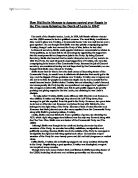Another central factor in Stalin’s victory was his cunning and excellent tactics. Stalin skilfully presented himself to the people as Lenin’s heir. He was extremely lucky that leading Communists decided not to publish Lenin’s testament, in which Lenin proposed that Stalin be removed from his post as General Secretary, because the testament also contained criticisms of them. Stalin cleverly played different groups within the party off against each other and was not opposed to making alliances whereas Trotsky was. Stalin first allied himself with the left wing of the party, with Zinoviev and Kamenev, to defeat Trotsky at the 1924 Party Congress and then used Bukharin (a right wing Communist) to rid himself of Zinoviev and Bukharin and expel them from the party. Stalin then became the single leader of the Communist Party by attacking Bukharin and other right wing MPs’ support of the NEP and removing them from their posts. Stalin was particularly astute with regard to his treatment of Trotsky and the way he manipulated others’ views of Trotsky. Stalin tricked Trotsky into not attending Lenin’s funeral and later played on other people’s fears of Trotsky and his radical views to get him expelled from the party.
Trotsky’s failure to attend Lenin’s funeral, though through no fault of his own, made him enemies. People thought that Trotsky couldn’t be bothered to turn up and that he had no respect for Lenin. Leading Communists were concerned that Trotsky would move away from Lenin’s policies and his failure to attend the funeral enhanced these fears. Meanwhile, as Trotsky seemingly moved away from Lenin, Stalin was busy promoting himself as Lenin’s chosen heir and as the stable choice for election. Trotsky’s loyalty to the Communists was also in doubt as he had only joined the party in 1917, while Lenin had been a loyal member for over twenty years. Although Trotsky was an excellent orator and had orchestrated victory in the civil war he had many negative personality points that meant he was greatly disliked. In fact, Trotsky’s impatience with those he considered stupid, and his arrogance in his unmitigated belief that he would succeed Lenin, were probably more crucial in securing votes for Stalin than Stalin’s actual personality. Many saw Stalin as being extremely dull and boring, although this was a façade behind which he hid his ambitious personality and, because of this misconception, Communists were prepared to do deals with Stalin, as he appeared to be no threat at all. The way Stalin presented himself and the way he influenced the light in which others saw Trotsky was significant in bringing about victory for himself. However, the personalities of the candidates would not have been so crucial if Stalin had not been as cunning as he was in publicizing Trotsky’s bad points.
Another factor, which Stalin greatly employed to his advantage, was the split within the party regarding the way forward. The left wing of the party, which Trotsky belonged to, believed that the way forward was with Trotsky’s views of “Permanent Revolution”, to bring the country round to Communism quickly, abolish the NEP and support other countries in staging revolutions. The right wing of the party wanted to move more slowly towards Communism and supported the NEP as a means of moving forwards. Stalin used his great astuteness to play off one faction of the party against another. This is a factor that would have been irrelevant if Stalin’s great slyness had not enabled him to exploit this party divide to his advantage; even without this divide, given other factors, Stalin would probably have won anyway.
All these factors interrelated to enable Stalin to become undisputed leader of Russia in 1929. His position as General Secretary was his power base and enabled him to pack the party with his supporters. His shrewdness and tactics allowed him to get rid of his opposition and also allowed him to cause fighting within the party to his advantage, his dull exterior meaning that while doing these things he was never seen as being a threat to anyone else. Stalin was supported as the more middle-of-the-road Communist, in comparison to Trotsky, and all the above factors worked together to bring about his victory.







